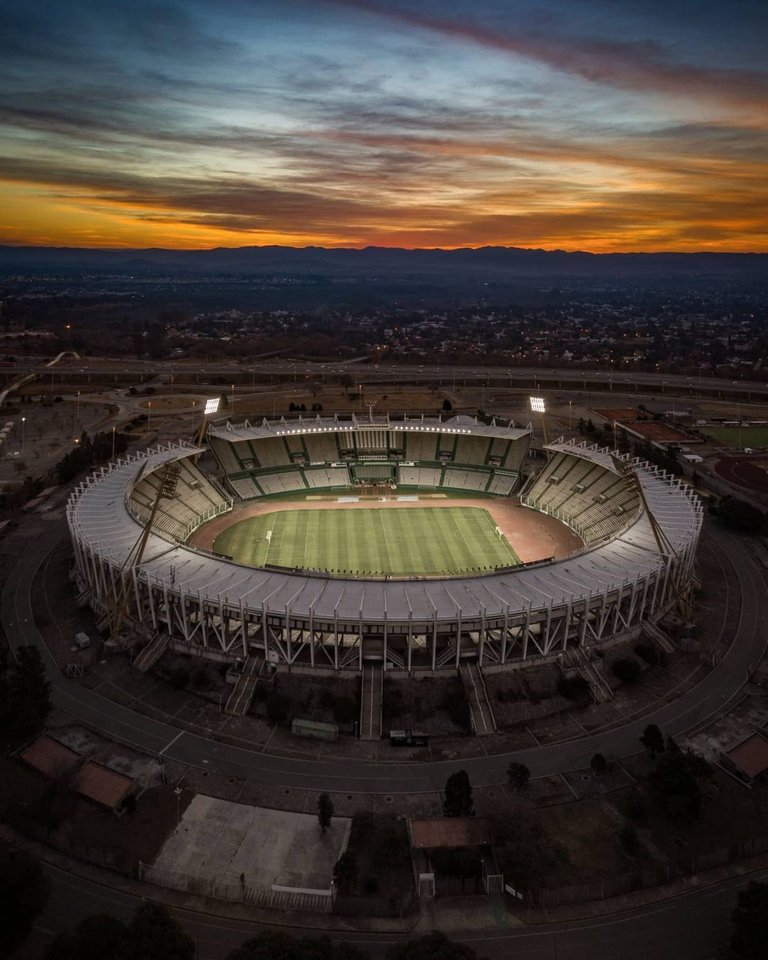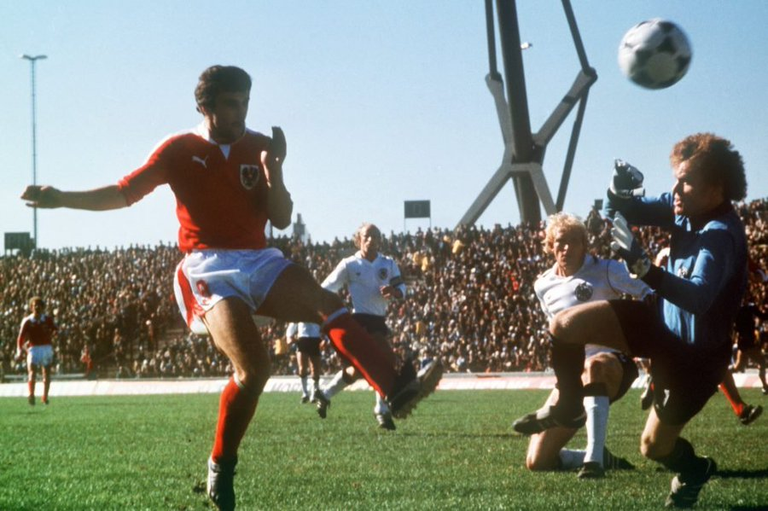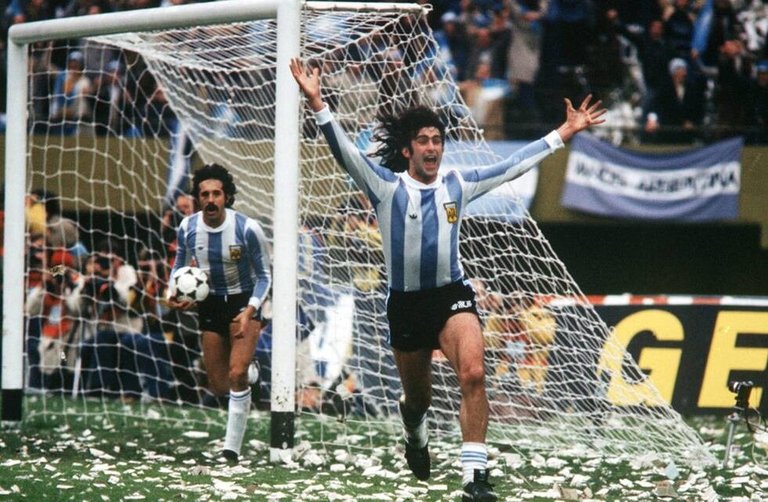Un violín austríaco en Córdoba (SPA-ENG)

Imagen creada con asistencia de ChatGPT
Ocurre con frecuencia que el deporte y también aquellos que lo divulgan, analizan y siguen, son banalizados, menospreciados por determinadas personas que creen que es una función menor dentro del universo de actividades en que se desenvuelve el ser humano.
Sin embargo, como cualquier otra tarea o trabajo que las personas emprenden, la actividad deportiva no es una isla solitaria en medio del océano, forma parte y crea interrelación con otros aspectos de la vida misma, como el entretenimiento, la salud, la economía, el turismo, incluso la cultura y las costumbres.
En mi archivo digital, si digital porque no todo está en mi memoria, tenía guardados un par de artículos sobre un evento curioso, cultural, emotivo e histórico ocurrido en la ciudad de Córdoba, capital de la provincia homónima, aquí en mi país, algunos años atrás.
Y ese hecho curioso tiene sus orígenes en el fútbol, más precisamente en el mundial de la especialidad desarrollado aquí en Argentina en 1978.

Estadio Chateau Carreras, ciudad de Córdoba, recuerdo el encuentro entre Alemania Occidental y Austria, por la segunda fase de aquel mundial cuyo formato era muy diferente al que estamos acostumbrados en esta época. Solo jugaban por entonces 16 equipos divididos en 4 zonas, Austria había sorprendido a todos al quedar primero en su grupo por delante de Brasil, España y Suecia, estos dos últimos eliminados. Con Brasil terminaron empatados en puntos, aunque con un gol más a favor.
La segunda fase quedó conformada por 2 grupos, 2 ganadores de los grupos de la primera fase y 2 segundos, en el que formó parte Austria estuvieron además Italia, Alemania Occidental y Paises Bajos, por aquel entonces todavía conocido como Holanda. El conjunto austríaco perdió por goleada con Paises Bajos, 5 a 1, también perdió con Italia, aunque solamente por 1 a 0. Así llegaba al partido con Alemania, eliminado y sin grandes presiones, no tenía ninguna posibilidad de continuar en el torneo. Muy distinto era el panorama alemán, con un empate entre la azzurra y la naranja mecánica y un triunfo propio le daba llegaba a la final para defender su título de 1974.

El encuentro comenzó muy bien para Alemania Occidental (todavía separada de Alemania Oriental por el muro de Berlín) se adelantó rápidamente en el marcador con un tanto de su genial goleador Karl-Heinz Rummenigge, todo parecía encaminado a una cómoda victoria teutona, sin embargo pronto las cosas cambiaron, un gol en contra y otro más de la modesta Austria dieron vuelta el marcador, los alemanes volvieron a empatar y parecía que al menos podían aspirar al partido por el tercer puesto, faltaba lo mejor, a 3 minutos del final Franz Krankl anotó el tercero y definitivo gol para el triunfo de Austria, el primero logrado ante su poderoso rival desde 1931.

Cuentan que un relator austríaco de nombre Edi Finger comenzó a gritar el gol como desesperado, arrojó todos sus papeles por el aire embargado por la emoción. Eso no sería de destacar en relatores y periodistas de por aquí, acostumbrados a la pasión futbolera, pero en Austria no se practicaban semejantes actos de entusiasmo y todo el mundo se asombró al escuchar esos gritos de alegría, a partir de ese momento Finger fue considerado un héroe deportivo, tan solo por exteriorizar sus sentimientos.
Por supuesto, hay una rivalidad manifiesta entre austríacos y alemanes que va mucho más allá de lo estrictamente futbolístico, para ellos Alemania es el vecino rico y poderoso, se sienten David frente a Goliat, en toda Austria este partido es recordado como "Das Wunder von Córdoba" es decir el milagro de Córdoba y en Viena pusieron el nombre de "Cordobaplatz" a un solar en pleno centro de la ciudad, homenaje explícito para recordar esa extraordinaria victoria.

El estadio mundialista Mario Alberto Kempes de la ciudad de Córdoba, renombrado de esa manera como homenaje al goleador y mejor jugador de aquel mundial que fue el primero ganado por Argentina, tiene desde hace algunos años un museo que incluye muchos objetos, fotografías e información de esa gesta mundialista y también del famoso encuentro ganado por Austria. Se ha convertido en un lugar de peregrinación para los austríacos amantes del fútbol que visitan el país. Entre ellos, en el año 2019 llegó el director de orquesta Julian Rachlin invitado por la orquesta filarmónica de Luxemburgo a realizar una gira por Sudamérica, Rachlin pidió permiso para tocar su violín debajo del arco donde muchos años antes Krankl convirtió el gol de la victoria, inclusive solicitó una pelota y simbólicamente la introdujo en la meta con su pie recreando aquel histórico momento.
Amante de Beethoven y admirador de Krankl a quien conocía de su club favorito el Rapid de Viena, el violista realizó de la forma en que sabe, su sentido homenaje; aunque tiene en claro y muy presente que el genial compositor era de origen alemán y Hitler austríaco.
An Austrian violin in Córdoba
It often happens that sports, as well as those who promote, analyze, and follow them, are trivialized and belittled by certain people who believe them to be a minor function within the universe of activities in which human beings engage.
However, like any other task or work that people undertake, sports are not a lonely island in the middle of the ocean. They are part of and interrelate with other aspects of life itself, such as entertainment, health, the economy, tourism, and even culture and customs.
In my digital archive—yes, digital because not everything is in my memory—I had saved a couple of articles about a curious, cultural, emotional, and historical event that occurred in the city of Córdoba, capital of the province of the same name, here in my country, a few years ago.
And this curious fact has its origins in football, more specifically in the World Cup held here in Argentina in 1978.
Chateau Carreras Stadium, in Córdoba, I remember the match between West Germany and Austria in the second round of that World Cup, whose format was very different from what we're used to these days. At the time, only 16 teams were playing, divided into four groups. Austria had surprised everyone by finishing first in their group ahead of Brazil, Spain, and Sweden, the latter two of whom were eliminated. They finished tied with Brazil on points, albeit with one more goal in their favor.
The second round consisted of two groups: the two winners of the first round groups and the two runners-up. Austria also participated in the group, which also included Italy, West Germany, and the Netherlands, then still known as the Netherlands. The Austrian team lost 5-1 to the Netherlands, and also lost to Italy, although only 1-0. Thus, they went into the match with Germany, eliminated and without much pressure, with no chance of continuing in the tournament. The German picture was very different, with a draw between the Azzurri and the Clockwork Orange, and a victory of their own meant they reached the final to defend their 1974 title.
The match started very well for West Germany (still separated from East Germany by the Berlin Wall). They quickly took the lead with a goal from their brilliant striker Karl-Heinz Rummenigge. Everything seemed set for a comfortable German victory. However, things soon changed. An own goal and another from the modest Austria turned the score around. The Germans tied it again, and it seemed they could at least aspire to the match for third place. The best was yet to come: three minutes from time, Franz Krankl scored the third and decisive goal for Austria, the first against their powerful rival since 1931.
It is said that an Austrian commentator named Edi Finger began to shout the goal in despair, throwing all his papers into the air, overcome with emotion. That wouldn't be a highlight for local journalists and commentators, accustomed to football passion, but such acts of enthusiasm weren't practiced in Austria, and everyone was amazed to hear those shouts of joy. From that moment on, Finger was considered a sporting hero simply for expressing his feelings.
Of course, there is an open rivalry between Austrians and Germans that goes far beyond the strictly footballing aspect. For them, Germany is their rich and powerful neighbor; they feel like David versus Goliath. Throughout Austria, this match is remembered as "Das Wunder von Córdoba," meaning the miracle of Córdoba. In Vienna, they named a vacant lot in the heart of the city "Cordobaplatz," an explicit tribute to that extraordinary victory.
The Mario Alberto Kempes World Cup Stadium in the city of Córdoba, renamed in honor of the top scorer and best player of that World Cup, the first won by Argentina, has had a museum for several years now, which includes many artifacts, photographs, and information about that World Cup feat and also about the famous match won by Austria. It has become a place of pilgrimage for Austrian football lovers visiting the country. Among them, in 2019, conductor Julian Rachlin was invited by the Luxembourg Philharmonic Orchestra to tour South America. Rachlin asked permission to play his violin under the goal where Krankl had scored the winning goal many years earlier. He even requested a ball and symbolically kicked it into the goal, recreating that historic moment.
A lover of Beethoven and an admirer of Krankl, whom he knew from his favorite club, Rapid Vienna, the violist performed his heartfelt tribute in the best way he knows how. Although he is clear and very aware that the brilliant composer was of German origin, and Hitler was Austrian.
Héctor Gugliermo
@hosgug
Bonita historia...
A falta de la vinotinto, Alemania y Argentina han sido mis equipos preferidos de siempre...el primero por su fútbol práctico y efectivo, el segundo desde que ganó aquel campeonato mundial del 78´, donde me enamoré del deporte rey.
Gracias por contribuir con la calidad de tu pluma, con nuestro feed.
Afectuoso abrazo!
No se el motivo, probablemente porque Alemania nos ha quitado en dos ocasiones la posibilidad de acceder a nuevos campeonatos mundiales (1990 y 2014) pero no me gusta, no la quiero. jajaja.
Ahora que lo pienso bien, la única selección que quiero entre las más poderosas es Italia, un poco menos España, el resto "no me simpatizan" haciendo mías las palabras de Quico, uno de los personajes del Chavo del ocho.
Saludos @fermionico!
Es sencillo para vos tener a un equipo odiado, porque vuestro país ha asistido a casi todos los mundiales. Pero, para quienes somos de países que nunca han asistido a una copa mundial, pues las preferencias y odios son mucho más difusos.
Espero que la vinotinto clasifique, para comenzar a odiar al país que nos gane el primer juego en el mundial🤣
De tu boca brotan las verdades como porotos de la chaucha decía mi abuelita.
¡Ya vendrán tiempos mejores!